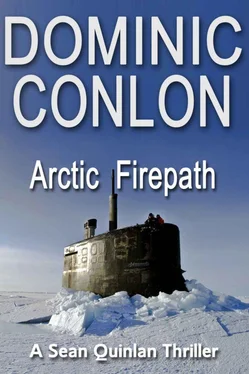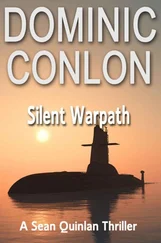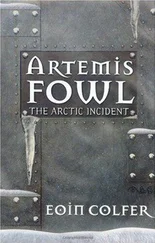Pierce didn’t even bother to reply, disappearing quickly from the room.
‘Cooke. Contact base. Find out what has happened there. Tell them we have taken a hit and are preparing to leave the ship. Oh, if they are in good shape, ask them if they can patch me through to the White House.’
‘Sir!’
The public broadcast speakers burst into life with orders in Russian for the crew of LK-80 to muster to their stations.
Colonel Grey caught a SEAL, about to leave the saloon. ‘Find the SRDRS program manager. Tell him to report to me immediately!’
‘Sir!’ The man wheeled smartly and double timed to the door. Even in the heat of the crisis Colonel Grey found time to admire the SEALs alertness and crisp reactions to orders.
Lieutenant Colonel Cooke re-appeared. ‘I’ve made contact with base. It came under attack from a single Russian warplane. The strike was unprovoked. Altogether five bombs were released, but luckily there were no direct hits on the huts, and no fatalities. All the bombs were way wild of the target.’
‘Good. What about the patch to the situation room?’
Cooke spoke into his handset. ‘Putting you through now.’ He handed over the phone.
In a few short sentences Colonel Grey summarised the situation, adding ‘we need backup Mr Secretary.’
‘Tell me what you need.’ The voice of the Secretary of Defence, Brindle Harris, was faint but unmistakable.
‘We will need air cover in case there’s another attack. The next time there could be a squadron or more — who knows.’
‘Right, anything else?’
‘Yes.’ He checked his watch. ‘There are still four hours to go before the Russian deadline expires. Why did the Russians renege on the agreement?’
‘We don’t know. The raid came as much as a surprise to us as it did to you.’
‘Perhaps you could put pressure on the Russians to call off any new strike? We’re still bringing up men from the USS Montana.’
‘You bet we will be doing just that, Colonel. Keep me up to date.’
‘Yes sir, and thank you sir.’
Grey handed the phone back to Cooke, and looked up as the SRDRS program manager arrived. ‘Dan. Sitrep please.’
‘We were about to send the PRM down again. We’ve had to call a halt when we took the hit.’
‘How many more trips?’
‘Three more sir. If it wasn’t for the bomb, we would be finished in about three hours. Now we have to assess the equipment to see if anything got damaged. As far as we can tell, nothing is broken but we’ll have to determine if the A-frame was strained beyond the allowed tolerances.’
‘Colonel Grey frowned. Could we continue anyway?’
‘We might lose the whole PRM, and sixteen people inside it, if we continued without checking.’
Grey sighed. ‘Right, Dan. As quickly as you can please.’
By now the saloon was almost deserted. Major Pierce arrived with one man in tow.
‘What have you got here Pierce?’
‘Thought you should hear what he has to say. He’s one of the two experts looking after the reactor.’
Grey nodded and turned to the man. ‘I gather you had a lucky escape?’
‘Yes sir. We were in the reactor control centre when the bomb dropped. The room was untouched, but the bomb pierced the steel deck of the reactor hall. My partner is in there assessing the damage.’
Grey drew his fingers through his hair. ‘What’s your opinion?’
‘Well the bomb plunged through several levels, but stopped short of holing the hull. We think the ultra-strong steel outer plates prevented a breech.’
‘Is there anything else?’
‘Yes sir. We’re still examining the systems in the Nuclear Power Plant, so the full extent of the situation won’t be known for some time. However, what we do know is that the effect of the bomb exploding in the confined space has damaged at least one of the reactor’s safety systems.’
‘Could you be more specific? Will we have to abandon the ship?’
‘At some point we might have to.’
‘In the next hour or two?’
The engineer nodded. ‘The reactor seals had already been damaged by toxic contamination. We put in an urgent request for expert help to be flown out.’
‘Expert help? But you’re the expert.’
The man hunched his shoulders. ‘We’re the experts when it comes to American built Pressurised Water Reactors. The Russian versions are different.’
‘They can’t be that different, surely?’
‘Yes they can sir — especially the backup safety systems. We don’t have any experience of them. They’re, ah, largely untried and we certainly don’t have enough time or experience to understand them, let alone operate them.’
The Colonel stared at him. ‘What are you saying?’
‘We could cause the reactor to go into meltdown.’
‘You mean, it could explode?’ The Colonel’s face lost some of its colour.
‘No, Colonel. But the end result might be the same.’
‘Jesus, man. Make sense. Why can’t you just shut the thing down?’
‘When the missile dropped, the first safety system activated automatically. Normally it would force the absorber rods into the core and quench the nuclear fission process.’ The engineer curled the fingers of one hand into a fist, leaving a small hole. He used two fingers on his other hand to slide them in. ‘However the explosion caused several of the control rods to be bent out of alignment and they could not be forced down their guide channels.’ Withdrawing the fingers, he curled them and tried to reinsert them, demonstrating how they became blocked.
‘Sir, the reactor cannot be SCRAMMED, meaning that unless one of the other safety systems are operated successfully, the temperature will continue to rise and it will reach meltdown.’
‘What happens then?’
‘The Uranium fuel rods will melt. That would happen at about 2,700 degrees Celsius — just over half the surface temperature of the Sun.’
‘Good God. I suppose at that temperature it would melt through anything.’
‘Correct. After a period it would melt through its containment vessel. But it wouldn’t stop there. It would burn through the floor plates and the bilge, and carry on through the hull of the ship.’
‘What would happen then?’
The man avoided eye contact. ‘The molten uranium would react with the seawater. There would be a huge explosion producing a radioactive steam cloud that would cover most of the Arctic. Some of the fallout would be dispersed by the wind, but the strength of the explosion would force most of the contamination into the high atmosphere. It would come down eventually and settle on the ice and waters of the Arctic Ocean.’
Colonel Grey was quiet for a moment. ‘How bad would the explosion be?’
The engineer thought for a second. ‘Two of the biggest explosions from a meltdown came from Chernobyl, and the second from the Fukushima Daiichi plant which suffered multiple meltdowns. In both cases when the melt burned through containment it sank into the earth to a depth of about 50 feet.’
‘Yes, but what is your point?’ asked Grey impatiently.
‘The point is that the explosions occurred when the melt reacted with the small amount of groundwater in the soil. In this particular case there is only water underneath the keel, so the explosion would be much greater.’
‘How much bigger?’
The man shrugged his shoulders. ‘I can only begin to guess. We could be looking at a detonation creating a hole in the Arctic ten to twenty kilometres wide. But that isn’t the worst part.’
Colonel Grey was visibly struggling to keep calm. ‘What do you mean?’
‘Most of the nasty contaminants like strontium-90, americium-241 and various plutonium isotopes didn’t escape at Fukushima because the plant had good containment structures. Once the melt reaches the seawater under LK-80, there will be no containment.’
Читать дальше












